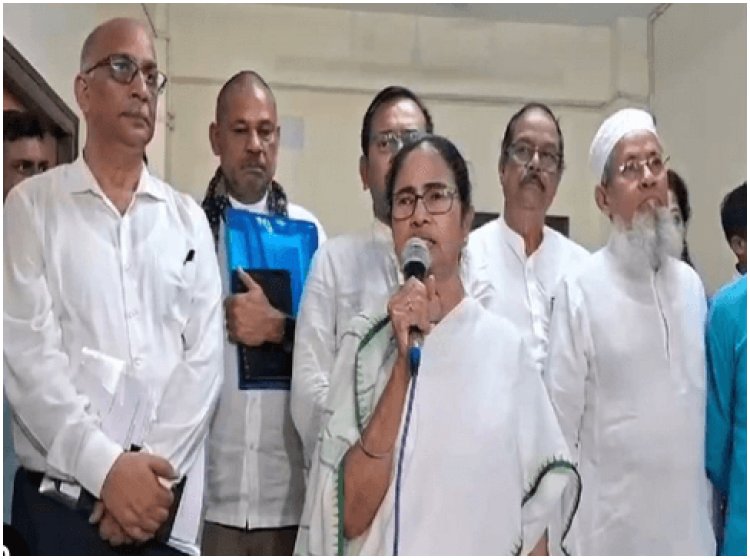Mamata Banerjee Fights for West Bengal: Criticizes DVC's Water Release Amid Devastating Floods
Mamata Banerjee Fights for West Bengal: Criticizes DVC's Water Release Amid Devastating Floods

Mamata Banerjee, criticized the Damodar Valley Corporation (DVC) for releasing excess water during heavy rains, which has exacerbated flooding in the region
West Bengal has recently faced a severe flooding crisis that has wreaked havoc across several districts, leading to widespread devastation and displacing thousands of residents. In the midst of this challenging situation, Chief Minister Mamata Banerjee has emerged as a vocal critic of the Damodar Valley Corporation (DVC), which is responsible for managing the river's water resources. Banerjee's sharp criticism focuses on the DVC's decision to release excess water during heavy rainfall, a move she argues has significantly worsened the flooding conditions throughout the region.
The heavy rains that struck West Bengal were part of an extreme weather pattern that has increasingly affected the state, leading to sudden and unpredictable flooding. The DVC's actions in releasing excess water from its dams, particularly during such critical weather events, have sparked outrage among local officials and residents alike. In her statements, Banerjee emphasized the importance of accountability, demanding that the DVC take responsibility for its actions and their consequences.
The release of water from DVC’s dams without adequate warnings has come under intense scrutiny. Critics argue that this decision has directly contributed to the rapid rise in water levels in downstream areas, exacerbating the flooding crisis. The Chief Minister Mamata Banerjee has accused the DVC of negligence, stating that such actions demonstrate a lack of coordination and foresight in managing water resources during adverse weather conditions. This situation has led to serious consequences for local communities, with homes, agricultural land, and critical infrastructure suffering extensive damage.
Mamata Banerjee government has been actively working to provide relief to those affected by the floods. Emergency services have been deployed to assist with rescue operations, and temporary shelters have been set up to accommodate displaced families. In addition, the state has been focused on delivering essential supplies such as food, clean water, and medical assistance to those in need. The efforts aim not only to provide immediate relief but also to begin the process of recovery for the communities impacted by the disaster.
As the situation unfolded, residents have expressed their frustrations not only towards the DVC but also towards the state government, which some believe has been slow to respond to the crisis. Many families have shared their harrowing experiences, highlighting the emotional and financial toll that the floods have taken on their lives. Mamata Banerjee vocal stance against the DVC reflects a growing demand for accountability and a reassessment of flood management policies in West Bengal.
In response to the mounting criticism, the DVC has defended its actions, stating that the decision to release water was made in line with established protocols and was necessary to prevent potential breaches of the dam. They argue that the heavy rains were unprecedented, complicating their management of water levels. However, this explanation has not alleviated concerns among the public, who demand better communication and planning from the corporation in future emergencies.
Recognizing the urgent need for change, Banerjee has called for an inquiry into the flood management practices of the DVC. This investigation aims to uncover the circumstances surrounding the release of water and to determine how such situations can be avoided in the future. The Chief Minister has urged the DVC to engage more effectively with local communities to address their concerns and enhance transparency in its operations.
As the floodwaters begin to recede, the focus is shifting towards recovery efforts. The West Bengal government has pledged to assess the damage caused by the floods and to provide financial assistance to affected families. Moreover, discussions are underway regarding long-term strategies for flood prevention and disaster management. The recent crisis has highlighted the urgent need for investment in infrastructure and better emergency response systems to mitigate the impact of future flooding events.
Community leaders and activists have also emphasized the importance of involving local residents in decision-making processes related to flood management. They argue that those most affected by such disasters should have a say in shaping policies and practices that impact their lives. This grassroots approach seeks to empower communities and enhance their resilience in the face of future challenges.
The ongoing dialogue of Mamata Banerjee between the West Bengal government, the DVC, and affected communities will be crucial in addressing the systemic issues that have contributed to the current crisis. The situation presents a pivotal moment for West Bengal to reassess its disaster management strategies and to implement measures that prioritize the safety and well-being of its residents.
In conclusion, the recent flooding crisis in West Bengal has revealed significant flaws in the management of water resources and emergency response systems. Chief Minister Mamata Banerjee's criticism of the DVC highlights the urgent need for accountability and improved coordination between agencies. As the state navigates the recovery process, prioritizing community involvement, investing in infrastructure, and developing comprehensive strategies for flood management will be essential. The lessons learned from this crisis will shape West Bengal's approach to disaster preparedness and response in the future, ensuring that the state is better equipped to handle the challenges posed by climate change and extreme weather events.

 shivani
shivani 



